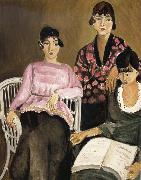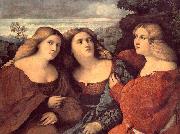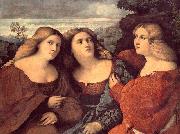Wholesale Oil Painting Reproductions No Minimum and Door to Door! |
|||||||||||
|
|
|||||||||||

|
|||||||||||
|
|
|
||||||||
All Henri Matisse Oil Paintings |
||||||||
|
|
||||||||
|
|
||||||||
|
Artist Introduction: French Fauvist Painter and Sculptor, 1869-1954
Henri Matisse is considered the most important French artist of the 20th century and, along with Pablo Picasso, one of the most influential modernist painters of the last century. Matisse began studying drawing and painting in the 1890s. A student of the masters of Post-Impressionism, Matisse later made a reputation for himself as the leader of a group of painters known as Les Fauves. An ironic label given to them by a critic, the name reflected Matisse's aggressive strokes and bold use of primary colors. In 1905 Matisse gained sudden fame with three paintings, including Woman with the Hat, purchased by the wealthy American ex-patriot Gertrude Stein. Beyond painting, he worked with lithographs and sculpture, and during World War II he did a series of book designs. Later in his career he experimented with paper cutouts and designed decorations for the Dominican chapel in Vence, France. Along with Picasso, |
||||||||
|
|
||||||||
|
The Three Sisters Painting ID:: 41564 |
mk164
1917
Musee de l-Orangerie
Paris |
|||||||
Height Width |
INS/CM Quality |
|||||||
|
X |
| |||||||
|
|
||||||||
All Palma il Vecchio Oil Paintings |
||||||||
|
|
||||||||
|
|
||||||||
|
Artist Introduction: (c. 1480 - July 1528), born Jacopo Palma or known as Jacopo Negretti, was an Italian painter of the Venetian school born at Serina Alta near Bergamo. He is called Palma Vecchio in English ("Old Palma" - in Italian Palma il Vecchio) to distinguish him from Palma Giovane, his great-nephew.
When Palma arrived in Venice early in the 16th century, he reputedly was a companion and competitor of Lorenzo Lotto, and to some extent a pupil of Titian. He may also have taught Bonifazio Pitati and influenced Giovanni Busi. Palma's earlier works betray the influence of the Bellini. |
||||||||
|
|
||||||||
|
|
The Three Sisters Painting ID:: 79664 |
ca. 1520(1520)
Oil on wood
Height: 88 cm (34.6 in). Width: 123 cm (48.4 in).
cjr |
||||||
Height Width |
INS/CM Quality |
|||||||
|
X |
| |||||||
|
|
||||||||
All Palma il Vecchio Oil Paintings |
||||||||
|
|
||||||||
|
|
||||||||
|
Artist Introduction: (c. 1480 - July 1528), born Jacopo Palma or known as Jacopo Negretti, was an Italian painter of the Venetian school born at Serina Alta near Bergamo. He is called Palma Vecchio in English ("Old Palma" - in Italian Palma il Vecchio) to distinguish him from Palma Giovane, his great-nephew.
When Palma arrived in Venice early in the 16th century, he reputedly was a companion and competitor of Lorenzo Lotto, and to some extent a pupil of Titian. He may also have taught Bonifazio Pitati and influenced Giovanni Busi. Palma's earlier works betray the influence of the Bellini. |
||||||||
|
|
||||||||
|
|
The Three Sisters Painting ID:: 83664 |
ca. 1520(1520)
Medium Oil on wood
cyf |
||||||
Height Width |
INS/CM Quality |
|||||||
|
X |
| |||||||
|
|
||||||||
|
Prev Next
|
||||||||
|
|
||||||||
|
Related Paintings to Palma il Vecchio :. |
||||||||
|
|
||||||||
|
CONTACT US |



